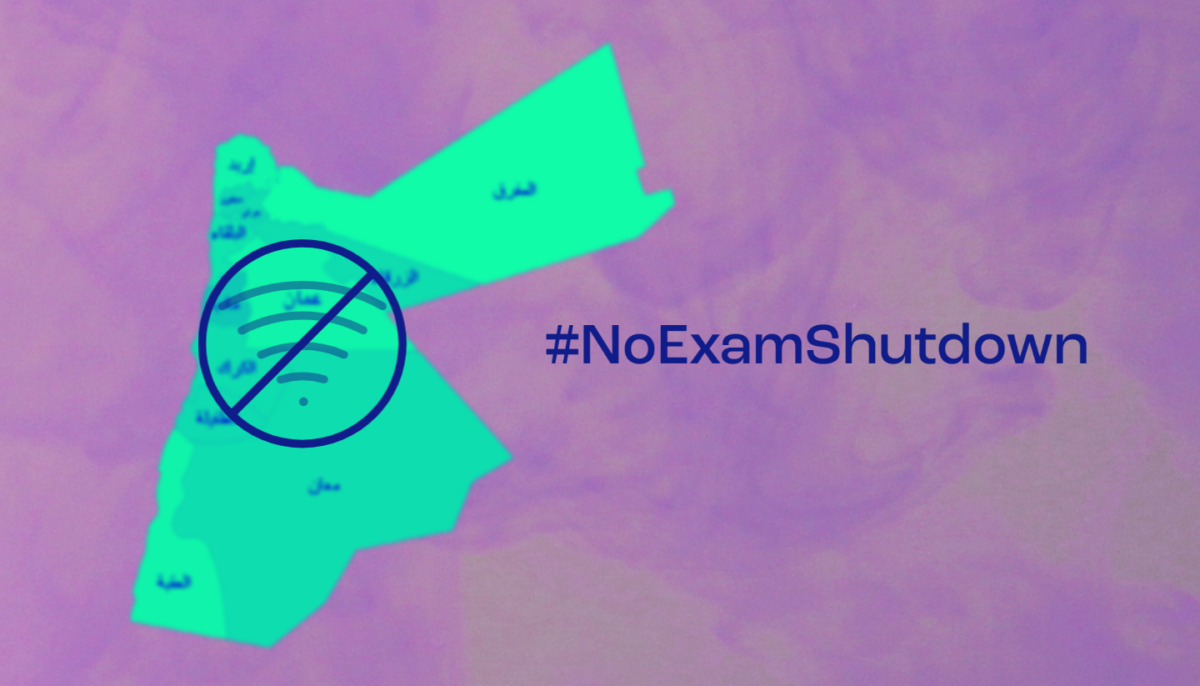It is estimated that more than 9.4 million people use the Internet in Jordan, according to the Telecommunications Regulatory Commission (TRC), with Internet penetration reaching 89% of the overall population. This is relatively a high rate compared to statistics from the rest of the Arabic-speaking countries, which has only reached 75%, according to World Stat. Logically, the high number of Internet users should reflect an improvement in telecommunications services, considering the increased reliance on the Internet as a basic facilitator of everyday affairs, and not simply as a luxury.
However, recent developments in the Kingdom have compromised the right to access the Internet and reach critical information. The TRC declared in an official statement that it had asked local telecommunications companies to disrupt messaging applications between June 24 and July 15 this year, to “preserve the integrity” of the General Secondary Education Certificate (Tawjihi) Examination, where results should fairly and transparently reflect students’ capabilities, and as a preventative measure against fraud or cheating.
It also stated that “the decision was taken in coordination with the Ministry of Education and will begin shortly before the examinations and end shortly thereafter.”
“Due to the nature of the telecommunications network coverage, disruption may affect areas beyond the school, but these are only temporary and serve their designated purpose,” the Commission added.
The Internet disruption strategy is a recurring one, employed each year during the General Secondary Education Certificate Examination. Jordanians have had different reactions to the decision, but the Internet disruption in homes and facilities near exam centers has undermined the legitimacy of this decision.
Legal Framework For Blocking Messaging Applications
The function of the Ministry of Education is to provide a sound, cheating-free environment during the examination period. However, disrupting messaging applications is a sovereign decision that must be issued by an authorized judicial authority, according to the Executive Director of the Jordan Open Source Association, Issa Mahasneh. He added that Jordan is a law-abiding State, hence laws must be promulgated by a judicial authority or the public prosecutor for them to enter into force. Laws cannot be issued by administrative bodies. There is no legal provision allowing the Ministry of Education to address the Telecommunications Commission in order to block sites, and public bodies may not issue resolutions based on administrative instructions without legal coverage.
Mahasneh explains that the TRC’s decision to apply the disruption resolution brings into question the Commission’s main mission: ensuring that the Internet is accessible to all subscribers, thus subjecting it to legal accountability by those affected.
Disruption Across Banks, Companies and Vaccination Centers
While the Telecommunications Regulatory Authority has emphasized that the disruption was limited and did not include Internet traffic, the Jordan Open Source Association received several complaints regarding the issue. It is noteworthy that internet service was completely disrupted in the morning, as reported by several companies and banks whose work was interrupted.
The decision also jeopardized the COVID-19 vaccination process. The Director of Health Affairs in Irbid, Dr. Riad Al Sheyab, said in an official statement that the disruption and poor quality of Internet services due to the Tawjihi Examination slowed down the pace of vaccination procedures across the city, causing crowded queues at the centers.
Dr. Al-Sheyab confirmed that workers in vaccination centers were unable to access registration data due to slow internet connection. He noted that these workers cannot vaccinate people unless it is verified they are not infected with COVID-19 to ensure their safety.
Alternatives to Internet Disruption
Cheating during official exams is a real problem that needs to be addressed, but the solution does not lie in Internet disruption, as evidenced by the number of attempts to leak questions this year. Mahasneh believes that tightening security procedures on students and prohibiting smartphones in exam rooms are more effective procedures.
Dr. Omran Salem, who specializes in information security and education and communication technology, told SMEX that some countries use jammers that completely disrupt the signal in localized areas. He also noted that there are numerous and diverse modern technologies to this purpose, such as those used to detect cameras in hotel apartments or listening devices, but these need security approvals to be used.
Notably, in 2016, the Ministry of Education announced the completion of all arrangements for the installation of jammers on mobile phones and headphones in public high school examination rooms as a step to tighten control over examinations at a high financial cost.
However, the Ministry did not use these jamming devices, and Dr. Omran noted that these devices needed specialized technicians to activate them. He also added that they were harmful to some cardiovascular disease patients.
Is Jordan Deliberately Disrupting the Internet?
Internet disruption was not limited to the General Secondary Education Examination, but it was also enforced during mass protests and political unrest. In 2020, Internet service was disrupted several times, and complaints were lodged by citizens on social media that Internet speed was deliberately slowed down, particularly during live-streaming.
Some human rights organizations have published posts on Facebook condemning the Jordanian authorities for imposing restrictions on Internet use. These restrictions intensified in the wake of protests over the Salth Hospital incident in March, where a shortage of medical oxygen killed nine COVID-19 patients. According to these organizations, the restrictions served to block live broadcasts of protests on social media.
Dr. Omran explained that there was no way to identify the cause of Internet disruption or who was behind it, considering that there are many legal and technical reasons that could justify Internet throttling and disruption, as in the case of blocking Clubhouse or VPN services. Until the time of writing this report, the party behind blockage is yet to be identified.
Internet Is a Human Right, Not A Commodity
Ensuring access to the Internet is no longer a matter of meeting demands; but a right to be respected at all times. As such, any state-led attempt to control the Internet, be it via network disruptions, disabling online applications or blocking communication platforms, is considered a breach to international human rights laws and standards, including the International Covenant on Civil and Political Rights (ICCPR), which Jordan has already ratified. Therefore, the Jordanian government must follow specific procedures to protect this right, provide legal guarantees for people to access the Internet at any time and abide by the United Nations Guiding Principles on Business and Human Rights, according to Mahasneh.



